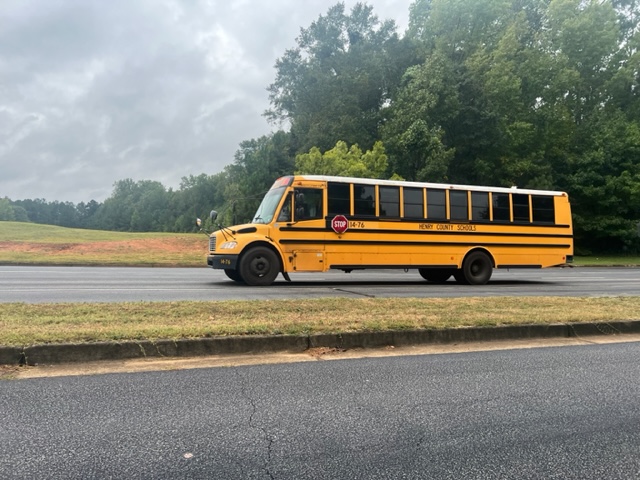Stay ahead of the curve as a political insider with deep policy analysis, daily briefings and policy-shaping tools.
Request a DemoElementary students improve in reading and math, while high school students backslide on Georgia Milestones tests

Header photo: Students in Georgia are catching up on pandemic-related learning loss, but the 2023 Georgia Milestones test results show they still have gains to make in reading, math, science and social studies.(Credit: kali9)
The 2023 Georgia Milestones test results show that elementary school students are making progress in recovering from pandemic learning loss in key academic areas, while middle schoolers had mixed results, and high school students continue to struggle.
What’s Happening
The results of the 2023 Georgia Milestones tests released on July 28 show that most elementary school students performed better on math, reading and English Language Arts assessments than they did last year, though their scores have not caught up to pre-pandemic levels.
Middle and high school students, on the other hand, tested lower in science, social studies and some math courses.
Overall, the Department of Education (DOE) reported that scores increased or held steady on 13 of 21 assessments this year as compared to the 2021-2022 school year, noting “clear improvement displayed in the critical area of third grade reading.”
The percent of third graders who scored at proficient or better levels on English Language Arts (ELA) tests increased by 3 percent, to 39% in 2023 from 36% in 2022, inching up towards the 42% proficiency level of 2019. And the percent of third graders reading at grade level or above increased to 66% this year from 64%. In 2019, 73% of third graders were reading on grade level or better.
Proficient learners are considered to be prepared for the next grade level or course and are on track for college and career readiness, according to DOE.
GEORGIA MILESTONES TEST RESULTS, 2019 – 2023
| ENGLISH LANGUAGE ARTS | ||||
| Percent of Students at Proficient Learner or Above | ||||
| 2019 | 2022 | 2023 | % Change 2022 to 2023 | |
| Grade 3 | 42% | 36% | 39% | +3 |
| Grade 5 | 45% | 41% | 42% | +1 |
| Grade 8 | 47% | 41% | 42% | +1 |
| American Literature and Composition* | 47% | 42% | 39% | -3 |
| READING STATUS | ||||
| Percent of Students at Grade Level or Above | ||||
| 2019 | 2022 | 2023 | % Change 2022 to 2023 | |
| Grade 3 | 73% | 64% | 66% | +2 |
| Grade 5 | 73% | 70% | 69% | -1 |
| Grade 8 | 74% | 70% | 71% | +1 |
| American Literature and Composition* | 74% | 69% | 67% | -2 |
| MATHEMATICS | ||||
| Percent of Students at Proficient Learner or Above | ||||
| 2019 | 2022 | 2023 | % Change 2022 to 2023 | |
| Grade 3 | 52% | 43% | 46% | +3 |
| Grade 5 | 41% | 37% | 37% | 0 |
| Grade 8 | 35% | 36% | 36% | 0 |
| Algebra I* | 40% | 37% | 36% | -1 |
| Coordinate Algebra* | 34% | 28% | 26% | -2 |
| SCIENCE | ||||
| Percent of Students at Proficient Learner or Above | ||||
| 2019 | 2022 | 2023 | % Change 2022 to 2023 | |
| Grade 5 | 42% | 39% | 40% | +1 |
| Grade 8 | 32% | 29% | 26% | -3 |
| Biology* | 48% | 46% | 46% | 0 |
| SOCIAL STUDIES | ||||
| Percent of Students at Proficient Learner or Above | ||||
| 2019 | 2022 | 2023 | % Change 2022 to 2023 | |
| Grade 8 | 41% | 37% | 36% | -1 |
| U.S. History* | 47% | 39% | 37% | -2 |
and are on track for college and career readiness.
*End of Course tests are taken by students enrolled in high school courses, including
some middle school students.
Source: Georgia Department of Education
State School Superintendent Richard Woods said in a statement released with the report that he was pleased to see “evidence of Georgia’s academic recovery” in the test results.
“Even for this year’s third graders, whose entire academic career has been impacted by the pandemic, we can see evidence of growth,” he said. “It’s particularly encouraging to see increases in English Language Arts and literacy, especially in the early grades — given all we know about the importance of learning to read, and then reading to learn, by third grade.”
Why It Matters
Research by the Annie E. Casey Foundation and others has shown that children who don’t read proficiently by the end of third grade are four times more likely than proficient readers not to graduate from high school. Poor literacy and lack of a high school diploma make such students less likely to attend college or a post-secondary institution, which ultimately limits their skills, knowledge, work opportunities and lifetime earning potential as an adult.
Georgia legislators have made improving literacy rates for pre-kindergarten through third grade students a priority this year by passing the Georgia Early Literacy Act and creating a new Georgia Council on Literacy.
The backsliding of high school math scores among Georgia students matters, too. While eighth graders did better in math this year, only 26% of high school students tested as proficient in Coordinate Algebra, as compared to 34% in 2019. And 36% of students were proficient in Algebra I, a four percentage point drop over 2019.
Algebra is another key indicator of a student’s future success, according to multiple studies, said Matthew Smith, director of policy and research for the Georgia Partnership for Excellence in Education (GPEE), a nonprofit advocacy group.
Passing or failing Algebra 1 “is a proxy for a kind of continued persistence by students — not just through high school, but even if they do graduate, whether or not they’re going to be prepared for entry-level college content in math, reading and science,” Smith said.
According to Bill Gates and the Gates Foundation, students who pass Algebra 1 by the end of ninth grade “open the door to advanced STEM courses and AP classes, and are more likely to enroll in college, graduate with a bachelor’s degree, and go on to well-paid, in-demand careers.” But students who don’t complete Algebra 1 have just a one in five chance of graduating from high school.
Low educational attainment also impacts the state’s ability to maintain an adequately trained workforce. By 2025, it’s projected that more than 60% of jobs in Georgia and the U.S. will require some form of a college education or quality credential beyond high school. Presently only 51% of the state’s workers qualify.
What’s Next
Woods, of the DOE, said, “Of course, there is still work to do, and we will continue to invest in strategies to address lost learning opportunities.”
He noted that many school districts have spent a large portion of federal pandemic relief funds on early literacy programs, and that elementary level ELA scores have rebounded. With most declines in Milestones scores occurring in science and social studies, and among high schoolers, Woods said DOE is “launching several new initiatives to ensure school districts have the resources they need to close these gaps.”
Those initiatives include hiring 100 certified teachers to serve as free online tutors to high school students through the new GaTutor program, which launches this fall, and partnering with the national service organization AmeriCorps’ math and reading programs to provide tutoring for up to 5,000 students in schools across the state.
DOE will also expand the availability to school districts of BEACON, an assessment system linked to the Georgia public school curriculum, and Milestones, which measures progress throughout the school year and helps teachers to better target instruction for students.
Dana Rickman, the president of GPEE, said the state may need to scale up those efforts in order to address the needs of students who are falling behind.
“I think all of those are helpful,” she said. “Those are great things to do. But when you think about scale and the number of communities and schools in Georgia, and they’re looking at 100 teachers to be trained in the online tutoring program — that’s a relatively small number. Who’s taking them up on that offer? And will it include communities that have lack of access to this kind of training?”
Regarding the AmeriCorps tutoring, Rickman said, “They’re hoping to reach about 5,000 students, which again is great. We have a million students enrolled in K through 12. And so, we feel like these efforts are good, but they’re sort of a start, and if they are to be as effective as we hope, we need to think about how things like that can be afforded to all schools and students across the state.”

The last round of federal American Rescue Plan Act funding for school districts to address learning loss and other negative impacts of the COVID-19 pandemic will expire in September 2024.
Georgia school districts have received nearly $6 billion in federal pandemic relief funding over the past three years. GPEE is partnering with DOE to conduct a four-year CARES Impact Study to look at how the funds were spent and the impact they’ve had on schools and students.
“As we come to the end of the Impact funding, it would be helpful to look at what districts have done that they have felt has been particularly effective in addressing a lot of these issues, in either the state or communities or districts,” said Rickman.
“How can we keep those things going, and allow districts to learn from other districts that found stuff that worked … in terms of promising practices around academic recovery?,” she said. “So I think there’s quite a few things that the state can do in thinking about scaling, but also in thinking about connecting the districts to each other around what worked.”
Read this related story:
Have comments or tips on education issues? Contact Jill Jordan Sieder on Twitter @journalistajill or at [email protected].
Twitter @StateAffairsGA
Instagram @STATEAFFAIRSGA
Facebook @STATEAFFAIRSUS
LinkedIn @StateAffairs
Header photo: Students in Georgia are catching up on pandemic-related learning loss, but this year’s Georgia Milestones test results show they still have gains to make in reading, math, science and social studies.(Credit: kali9)
Election officials blast U.S. postmaster ahead of November election for mail delays, poorly trained staff
Leaders of two national groups representing thousands of state and local election workers are imploring the head of the U.S. Postal Service to take “extraordinary measures” to fix the nation’s ongoing mail crisis that has led to lost and delayed election-related mail. The National Association of Secretaries of State and the National Association of State …
Weekend Read: New school buses arrive spring ’25; schools grapple with bus driver shortages
The Gist Georgia has ordered 256 new school buses to relieve the aging fleets in public schools around the state, but most of those new buses won’t be on the road until the end of this school year. What’s Happening “We’ll be looking at springtime before those buses start rolling,” said Ken Johnson, pupil transportation …
Mega Millions has generated over $17M in HOPE, pre-K funding since June
By now you’re acutely aware you’re not holding the winning ticket to this week’s $810 million Mega Millions Jackpot. That honor goes to a Texan who matched all six numbers. Take solace, though, knowing your weekly spending on lottery tickets in Georgia helps preschoolers get an early educational start and pays students’ way through college …
Presidential race aside, what’s at stake for Georgians in the November election?
The Gist Despite all 236 members of the state House and Senate up for reelection in November, the presidential race has taken center stage in Georgia with the nomination of Vice President Kamala Harris for U.S. president. Nonetheless, Georgia Democrats will be in a push-and-pull contest to gain more seats in both the House and …




